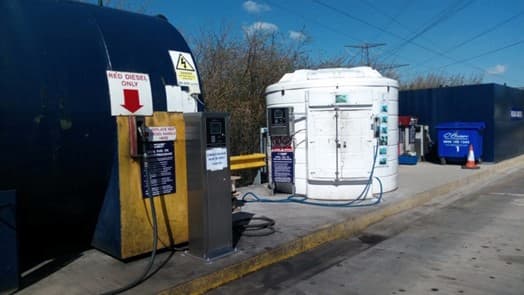Make Bunded Fuel Tank Maintenance Your Priority for Fuel Efficiency
There are many assets to manage when operating a commercial fleet, but monitoring your fuel efficiency should be the highest priority to guarantee smooth operations and reduced costs.
Tracking your fleet fuel use covers every aspect of your operations, but this can be simplified by focusing on one location: your current onsite fuel storage. Read on to explore how effective bunded fuel tank maintenance has a beneficial impact across your entire business and guarantees your fuel is being spent efficiently.
Risks When Ignoring Fuel Tank Maintenance
Despite their static nature, bunded fuel tanks are working pieces of equipment that need to be monitored for wear and tear, like any of the mobile vehicle assets you manage in your fleet. While all of our tank designs come with adequate safety measures, it is crucial that the tanks are regularly assessed so you’ll make informed decisions and prevent disaster from impacting your business. Here are some examples of the broad issues you’ll encounter when neglecting your tank maintenance.
Environmental Concerns
There are stringent regulations related to the installation and condition of onsite fuel tanks to protect the local environment, and tanks that are neglected will risk breaking them. Natural wear will degrade any piece of equipment, and the same is true for fuel tanks. Drips and minor issues will be caught by the bunded layer of the tanks, which are designed to contain them; however, these will need to be appropriately inspected at some point to prevent toxic oils from leaking out and causing environmental damage.
Workplace Site Safety Risks
Fuel tanks are always installed in safe locations at workplaces to minimise the danger to employees and the public if there is an accident. Still, this safety is easily compromised when a tank’s maintenance is ignored. Leaks will occur from significant degradation of the tank protective layers over a long time; additionally, if the tank has been subject to an accident or even damaged during a theft, any leaking fuel will put your workplace at immense risk. Loose fuel means a high probability of accidental ignition and widespread fire damage to your assets.
The risk is that the quality of our tanks means these examples are highly unlikely, which makes checking for wear something easily forgotten. We recommend scheduling a repeated event, either quarterly or annually, to assess your tank so you can make an informed decision about any maintenance needs.
Bunded Fuel Tank Maintenance Advice
With the busy winter season coming to a close, now is the perfect time to schedule a detailed tank review, assess the condition of this vital piece of equipment and prevent the previously stated risks for another year. With our tailored bunded diesel tank designs, each tank will have its own maintenance requirements; however, here is some general advice that applies to any tank maintenance.
Regular Assessment
The most important element to remember for any effective maintenance plan is to keep a regular, repeated schedule. This can be as often as weekly and monthly or spaced out to quarterly or annually. Establishing a quarterly review of your assets is often enough to keep the details fresh in mind but not so often as to hinder daily operations. Your plan should also be partnered with any fuel monitoring system you have in place, as the data from either one will have a significant impact on the other. Additionally, any unexplained and sudden decreases in your tank levels should generate an alert and encourage an emergency tank assessment in between maintenance checks.
Tank Cleaning
Regardless of the exterior condition of the tank, we highly recommend that you dedicate a period of low business activity (or before the tank is refilled) to cleaning the interior of your tank. The process will eliminate any trapped fuel or water from condensation inside the bunded or storage layers of the tank. We’ve already discussed the issues with leaked fuel, but the water will cause more corrosion, which will eventually lead to more leaks or harmful sludge.
Rust sludge is common in fuel tanks and will damage the delivery pipes as well as give a misleading impression of how much useable fuel is stored in your tank. All tanks are stored outside, and the exposure to weather results in different internal temperatures compared to the stored fuel and the empty space above it. This difference encourages condensation that generates rust as well as increases the amount of sludge in the bottom of the tank.
It’s important to note that cleaning a tank is a dangerous task and should only be completed by a qualified professional with the correct equipment and experience.
Avoid Overfilling
Whilst this doesn’t seem like a maintenance issue, it is something to be monitored to prevent more disruptive maintenance issues from being needed later. Once you have eliminated the sludge from your tank, you should never overfill your tank. Despite the benefits of investing in wholesale fuel purchases, you must never overfill as it leads to most of the problems we’ve talked about, as spills impact the environment or are left to sit in the bunded layer; at the very least, it’s an inefficient use of your fuel expenses.
Bunded Fuel Tank Installation at Fueltek
We provide tailored bunded fuel tanks with a wide array of capacities ranging from 1,000 litres to 200,000 litres. Whether you have a small or large fleet, we guarantee an efficient fuel management system for your business with our broad range of products and solutions.
Contact us to discuss your business’s needs and find out how our tailored systems will improve your fleet’s fuel efficiency.










